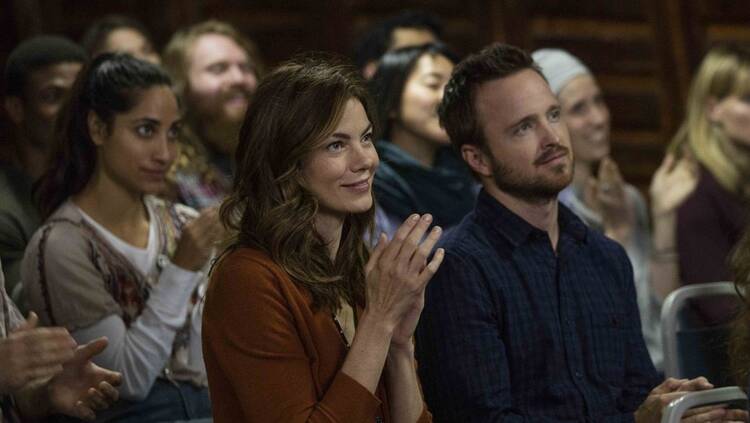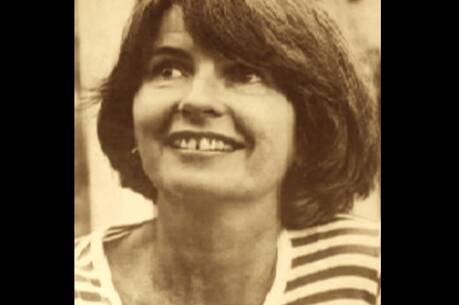Recently in Los Angeles unusual billboards have popped up all over town. “To my loved one in Scientology,” they read, “Call me.”
The work of two former Scientologists, these advertisements push back against the intense pressure Scientology, which is headquartered in Hollywood, puts on its members to permanently dissociate themselves from family members and friends who are not fully supportive of the organization. As much as recent documentaries, tell-all books and gossip columnists have tried, it remains difficult to fully understand what it is like inside organizations like Scientology, let alone to grow up or raise a family within their confines.
What keeps people there? Is there any possibility of real fulfillment within such a suffocating structure? And if not, as most suspect, what is it like to try and get out?
In Hulu’s new show The Path, we meet Eddie and Sarah Lane (Aaron Paul and Michelle Monaghan), members of the Scientology-like Meyerist Movement who live with their two children in the group’s upstate New York compound. Sarah, who works as a counselor in the organization, has been a member since birth. Eddie, like many members, found the organization at a difficult time in his life.
And until recently, he has never had any doubts about that choice—which is a far cry from what viewers will feel while watching. We first meet our main characters at a Sunday meal of Sarah’s extended family; holding hands for grace, it might look like we’re in store for something akin to “Parenthood” or “Brothers and Sisters,” some nostalgic embodiment of our dreams of family.
But their words are not some simple prayer of thanksgiving, but a sort of “New Age meets Gospel of Success” doxology about “ascending the ladder of enlightenment, so that some day we may be free of these earthly forms and live as light together in the garden.” And just like that, it’s clear that this is not TV’s typical idealized family, but something stranger and maybe a little scary.
That initial moment encapsulates both the possibility and the problem of “The Path.” On the one hand, the show takes life in this community seriously. It spends real time trying to get to know and understand these characters and the way they think about their lives. As Sarah walks around wearing a device to measure the movements of her energy, or Cal (Hugh Dancy), the group’s de facto leader, talks about the coming end of the world, there’s no winking at the audience, no “can you believe these guys”? Much like HBO’s “Big Love” did with polygamist Mormons, “The Path” fights to be true to these people and their choices.
The Panoptic’s Progress
The problem is a show about people who have convinced themselves to live under the conditions Meyerism imposes is very difficult to watch. Many of the scenarios are the same as any “normal” family: the Lane’s son, Hawk, gets in a fight at school; Eddie and Sarah have marital issues. But every moment of the show is fraught with menacing subtext. To deviate in any way from the set scripts of their community—happy family member, unquestioning Meyerist—is to feel those around you stepping back, looking upon you and evaluating whether you can be trusted. It’s not a coincidence that every Meyerist building has an enormous wood carving of an eye hung in a prominent place. The compound is Foucault’s Panopticon as suburban community.
Consequently every scene in “The Path” comes highly pressurized. Sarah loves her husband, but when she thinks he’s cheating on her, she has no trouble turning him in to Cal and their whackadoo treatment program. Hawk feels so bad when a fellow student pressures him into trying meat that he vomits as soon as he gets home.
Television dramas depend on great characters, but we also like an interesting world. People came to “Mad Men” in part for the advertising, “Breaking Bad” for the science, “Downton Abbey” for its “Upstairs/Downstairs” community.
In the case of “The Path,” though, that world is so monolithically burdened by its internal psychosis that watching it can be claustrophobic. The second episode briefly introduces a local FBI agent and just being with him and away from the Meyerists for a few moments is a great relief. What I wouldn’t give for someone with a sense of humor, a Maggie Smith to offer the occasional wry and devastating quip.
It’s interesting that Netflix’s “Unbreakable Kimmy Schmidt,” whose second season began on April 15, traverses the similar terrain of an earnest young woman freed from an apocalyptic cult after a decade in captivity to produce not a drama but a comedy. (As wrong as that concept sounds, the show is actually wonderful.)
“The Path” is a great idea, with a strong cast and a fine pedigree. The show’s creator, Jessica Goldberg, was a writer on “Parenthood,” and “Parenthood” and “Friday Nights Lights” creator Jason Katims is an executive producer. “The Path” also raises interesting questions for believers. Our own church, which to some seems populated with its own share of crazy ideas (like worshipping a crucified man or dining on the flesh of God), has gone through periods of unthinking obedience, suppressing ideas and voices asking essential questions, and with terrible consequences. What keeps us from becoming the smiling nightmare hellscape of a cult?
“The Path” seems to suggest that it may be less about having the right rules or leaders—though both are obviously essential—and more about our individual and communal willingness to be in an ongoing, personal relationship with God.








